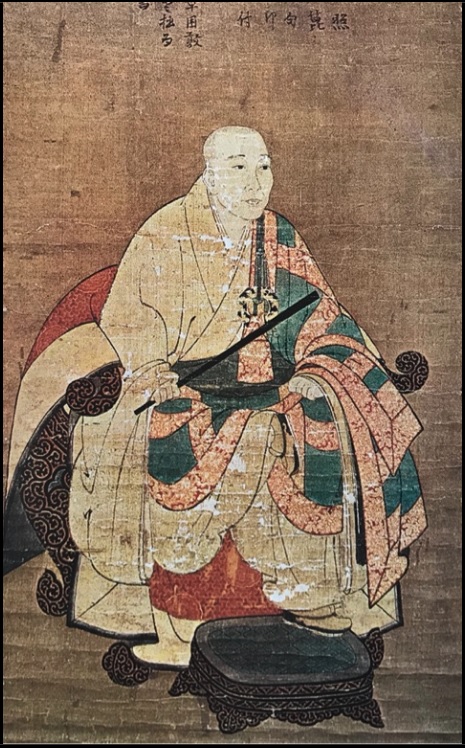ZEN MESTEREK ZEN MASTERS
« Zen főoldal
« vissza a Terebess Online nyitólapjára

華叟宗曇 Kasō Sōdon (1351-1428)
![]()
華叟宗曇 Kasō Sōdon (1351-1428)
When his teacher Ken'ō (謙翁 or けんおう) died in 1414 Ikkyū was despondent and "...spent a week in meditation by the shores of Lake Biwa before finally deciding to commit suicide by throwing himself into the lake. He was saved by a man sent by his mother who, knowing of his despondency, had feared he might turn to self-destruction." After he gave up suicide as a viable option he went to see if he could become a pupil of the stern disciplinarian Zen master, Kasō Sōdon (華叟宗曇 or かそうそうどん : 1351-1428). Kasō refused to see him but Ikkyū persisted. One day when the master was going out he saw Ikkyū standing by the gate. Kasō ordered his assistant to throw water on him. When he returned Ikkyū was still waiting so Kasō accepted him as a pupil. In 1418 Kasō gave Ikkyū his name which means 'a pause'.
華叟宗曇 KASO SODON
in: JAPANESE DEATH POEMS
Written by Zen Monks and Haiku Poets on the Verge of Death
compiled with an Introduction and commentary by YOEL HOFFMANN
Rutland, Vermont, Charles E. Tuttle Publishing, 1986, 368 p.
Died on the twenty-seventh day of the sixth month, 1428 at the age of seventy-seven
A drop of water freezes instantly--
My seven years and seventy.
All changes at a blow
Springs of water welling from the fire.Kaso was the teacher of Ikkyu and 養叟宗頤 Yōsō Sōi (1376-1458). His comparison of his seventy- seven- year- long life to "a drop of water [that] freezes instantly" symbolizes transience, the essence of this world of senses according to Buddhist doctrine. The "blow" that changes all refers to enlightenment: a thing no longer contradicts its opposite, and time and space are no longer perceived through the concepts of the ordinary mind. Life may seem to flee in a moment, but when the mind is freed of the veil of ignorance and illusion that comes between the mind and the truth, life and death are only opposite sides of the same coin--" water welling from the fire."
An important abbot of Daitoku-ji during this period was Ikkyu Sojun 一休宗純 (1394-1481). Ikkyu was the son of a lady of the imperial court of Emperor Go-Komatsu 後小松 (r. 1392–1412). When he was five years old, following his mother's expulsion from the court, he entered the temple Ankoku-ji 安國寺 in Kyoto and there learned the essentials of Chinese poetry, refining his knowledge during four years at Kennin-ji. Later he meditated with the hermit-monk Ken'o 謙翁 at the temple Saikin-ji 西金寺 ; after Ken'o's death he became the disciple of Kaso Sodon 華叟宗曇 (1352–1428), who lived in a hermitage on the shores of Lake Biwa. He spent nine years with Kaso, under whom he experienced a deep awakening while meditating on the koan “Dungshan's Sixty Blows,” and later had another profound realization when hearing the caw of a crow. After Kaso recognized him as his successor, Ikkyu spent a further thirty years as a wandering monk living and associating with all classes of the people. From the age of sixty he lived at Daitoku-ji, and was eventually made abbot of that great temple. One of his accomplishments was the restoration of the buildings of Daitoku-ji after their destruction during the Onin Wars (1467–77). Ikkyu remains a popular figure to this day, and is remembered for his wit and humor as well as his poetry and paintings.
In: The History of Rinzai and Obaku Zen
http://zen.rinnou.net/whats_zen/history.html
![]()
in: JISEI * 22. oldal
Zen-szerzetesek és haiku költők versei a halál mezsgyéjéről
Yoel Hoffmann nyomán fordította: Somogyvári Zsolt
Farkas Lőrinc Imre Kiadó, 1994
A műfordítások hitelességét ellenőrizte: Dr Janó István
*jisei [dzsiszei] (辞世の句 jisei no ku) =
= búcsúvers, halál vers
Meghalt 1428-ban, a hatodik hónap 27. napján, 77 évesen
Egy vízcsepp azonnal megfagy --
Hét és hetven évem.
Minden egy csapásra megváltozik.
A tűzből források fakadnak.
A 77 év hosszú élet egy vízcsepphez való hasonlítása a mulandóságot szimbolizálja. A változás hirtelen következik be -- a megvilágosodás után nincsenek ellentétek, a mindennapi tudat észlelési módjai megváltoznak. Élet és halál: csak ugyanazon érme különböző oldalai -- "a tűzből források fakadnak".